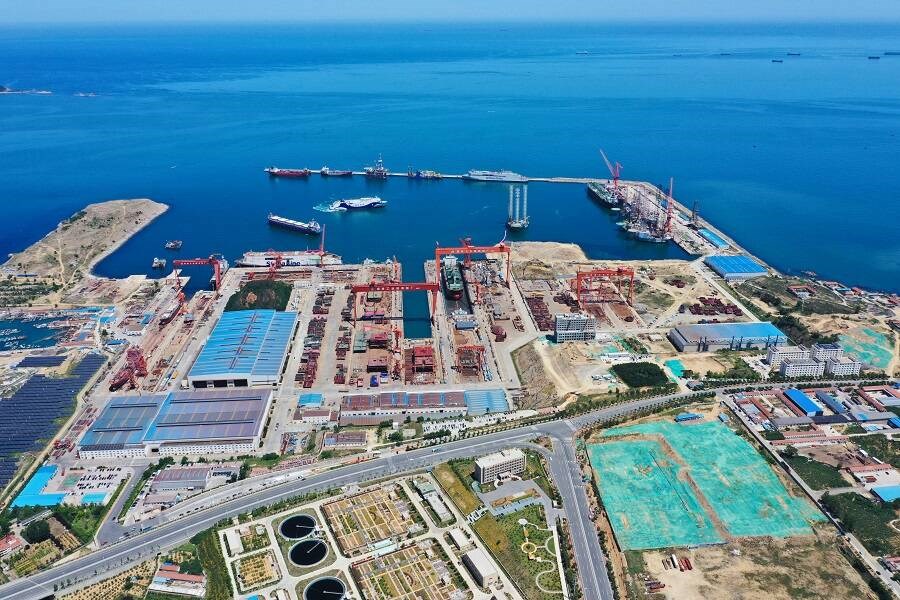The B.C. government’s elbows-up, Canada-first, buy-B.C. policy is about to undergo its first serious stress test, with news Tuesday that BC Ferries signed a multibillion-dollar deal with the Chinese government to build four major new vessels.
Ferries CEO Nicholas Jimenez said he’s been assured China Merchants Group (which on its website describes itself as a “key state-owned enterprise directly administered by the central government”) can build the ferries in a quick and cost-efficient way. No Canadian companies bid on the vessels, he added.
“Our focus is principally on getting the best deal for British Columbians and getting the best deal for BC Ferries,” said Jimenez.
“When it comes to things like trade policy, industrial policy, geopolitics, I think we would really defer that to the federal and provincial governments and expect them to manage and work those issues.”
It is a decision likely to be fraught with controversy, given China is a hostile international force to Canada and its allies. Ties have frayed since China detained two Canadians for spying in 2018. The two countries have been exchanging tariffs over the past year, with China hitting Canadian canola oil and seafood. China has also been accused of supplying weapons to Russia in its illegal occupation of Ukraine, which is receiving Canadian military support.
All that puts the BC NDP government in a bind.
The province has been heavily promoting a buy-local economic agenda in the face of U.S. President Donald Trump’s tariffs, going so far as to pass legislation to fast-track projects to strengthen the provincial economy against international forces.
Premier David Eby has also expressed public concern in the past about China’s role in money laundering, exporting fentanyl precursor chemicals and election interference. When BC Ferries made its announcement Tuesday, the premier was in South Korea visiting a shipbuilding company as part of an Asian trade mission. He deliberately excluded China from his trip.
“I do have concerns around procuring services from any country that is actively harming Canada’s economy through unfair tariffs or other protectionist trade practices,” Transportation Minister Mike Farnworth said in a statement.
“I have shared these concerns with BC Ferries.”
BC Ferries has argued it would be twice as expensive to build the ships in Europe, and triple the cost had any Canadian companies bid. The Weihai Shipyards specialize in passenger ferries, and has supplied them to Stena Line in Sweden, a major European ferry operator, as well as Canada’s Marine Atlantic ferry company. The company said it consulted the federal government for economic and national security issues.
Still, the blowback was immediate.
“This short-sighted choice will send hundreds of millions of dollars out of our province, profiting a brutal authoritarian regime instead of enriching local communities,” said the BC Federation of Labour.
Opposition Conservatives called it a “betrayal” of workers, national security and values.
“Premier Eby talks about building a stronger Canada—but when it mattered most, he turned his back on Canadian workers and handed the deal to Beijing,” said leader John Rustad.
Former Alberta Premier Jason Kenney accused Eby of hurting the Canadian economy by opposing a new oil pipeline from Alberta, while supporting the Chinese government.
“The Eby government seems eager to contribute to China’s massive increases in GHG emissions, while rewarding the PRC for its sterling record on human rights, forced labour, and DEI,” he posted on social media.
New Democrats, meanwhile, sought refuge in the quasi-private structure of BC Ferries that was set by the previous BC Liberal government and which it used to oppose.
Farnworth said the ferry corporation makes independent decisions. But he left out the fact the private company’s sole shareholder is the BC government, and that the NDP has stacked the two governance boards with appointees such that could overturn the decision if it wanted.
None of the criticism will come as a surprise to BC Ferries. It was prepared for, even expecting, the negative reaction.
The corporation has made a calculated risk that the savings on the ships will dovetail with a defrosting of relations between Canada and China between when construction starts in 2026 and the first ferry comes into service in 2029.
There are signs that might happen—Prime Minister Mark Carney had his first phone call with Chinese Premier Li Qiang late last week, and a joint communique by premiers last week already included the line that “first ministers emphasized the critical importance of regular and ongoing engagement with China at the highest level to improve the overall trade relationship.”
BC Ferries is clearly hoping that continues. And that its controversial decision survives any political fallout until then.
Rob Shaw has spent more than 17 years covering B.C. politics, now reporting for CHEK News and writing for The Orca/BIV. He is the co-author of the national bestselling book A Matter of Confidence, host of the weekly podcast Political Capital, and a regular guest on CBC Radio.
[email protected]
🚨New newsletter alert! Stay ahead of the curve in B.C. politics. Get expert political analysis delivered straight to your inbox, plus inside scoops and other stories from across the province. Sign up here for the Capital & Coast newsletter




